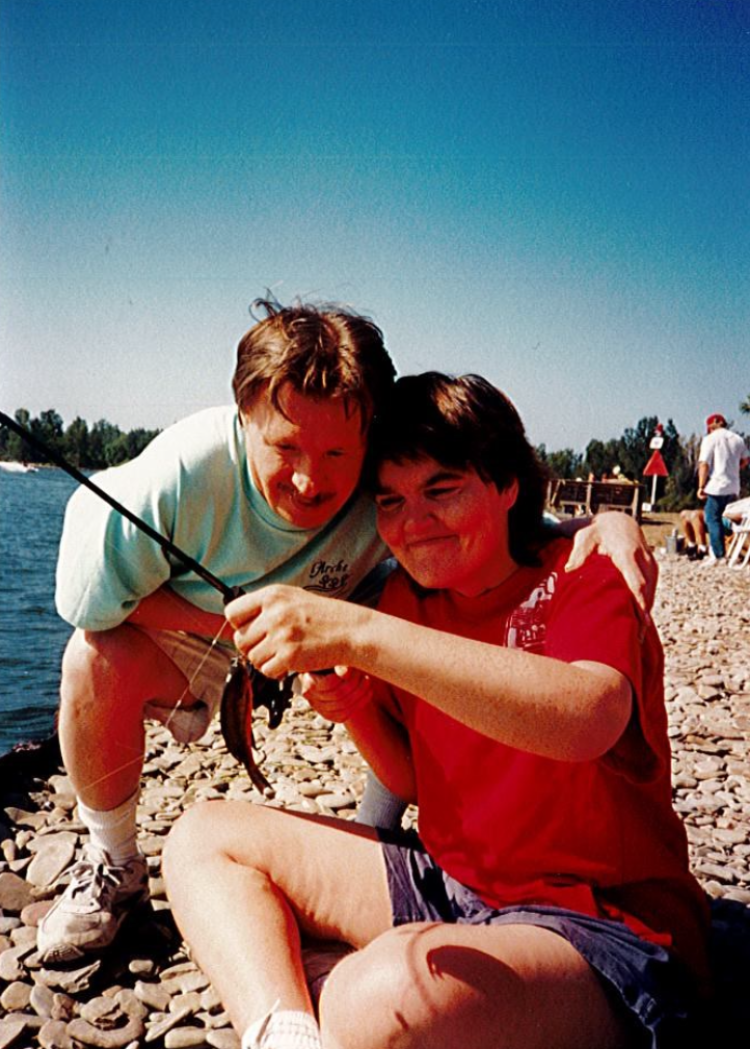One of the most impacting spiritual photos of the twentieth century was not published by a church. It came out of the Special Olympics, and was the air- pumping picture of a youth with Down syndrome who had just finished a race—dead last. His face was aglow. His eyes shone. His smile was full to bursting the confines of his face. He had done what he set out to do. He had become all he could in the doing of it.
He had stretched himself to the limits of the self and, as a result, became an icon for the rest of the world to measure themselves by as well. He had done his work and then stepped away from it. It was not the measure of his entire life. It was not his sign of triumph over others. It was the sign only of the fullness of himself.
As far as we know, he was never seen publicly again. No newspaper stories. No photographs. No scenes of celebration follow
him now. He simply left the arena of public display—happy, satisfied, fulfilled, and measured only by his own goals. He did what he had come to do and then disappeared back into himself to go on becoming in hundreds of other ways. He did not make a
business of the self.
Instead, he followed the advice of the Chinese poet Lao Tzu, who wrote, “Do your work, then step back. The only path to serenity.” This type of person lives too quiet to be heard, too small to be seen, too gentle to be noticed. But too important to be overlooked. These people teach us our own importance. More than that, they teach us to make a distinction between what we do and what we are. They teach us to live rather than to do.
In our culture, on the other hand, importance is expressed in the singular: we lionize the one person to win six triathlons in a row, for instance. Or the only person to scale a given mountain. Or the first person to fly around the globe in a balloon. We make people what they do.
As a result of our concentration on the achievement and competition that come from uniqueness, we are inclined to overlook the uniqueness of simplicity. We downplay the power of humility. We ignore the impact of the individual. We merge the person and the things they do to the point where we are in danger of losing a sense of the person at all.
Then we wonder why it is that loss destroys people and pride consumes them and humility puzzles us. But at the end of the day, we discover that humility—the strength to separate our sense of the meaning of life from what we do—is the only real answer
to lifelong happiness.
Competition infects every dimension of society: education, business, politics, play. Nothing is done for its own sake. Everything is done to win something, to get something, to best someone else, to prove the value of everyone in sight: young people, corporate leaders, political figures, athletes who would just as soon play the game for the sake of playing rather than consume their lives and sacrifice their bodies for the sake of winning.
It’s the comparative value of a person that counts in a society such as this, not the personality or the character or the morality
or the simple deep-down goodness of people committed to, as St. Philippine Duchesne put it, “simple duty daily done.” Instead, the society breeds a pathological pride for its need to succeed. And, as a result, it nurtures a pride far beyond the healthy joy of those who have done their best; it leads to a pride that in its devotion to mastery, to recognition, to superiority, agitates the
proud to the point of despair. It makes them fierce seekers of advantage in everything, and it infuriates them when they lack that advantage. It leaves them, ironically, losers on the levels that, in the end, are the only ones that really count.
TUESDAY, APRIL 1: Only the humble are truly happy. There is nothing they have that anyone can take from them, and all that they have, whatever it is, they enjoy for its own sake. “True humility,” Henri Frederic Amiel wrote, “is contentment.”
WEDNESDAY, APRIL 2: Humility, the ability to go through life with open hands and an accepting heart, is the gift that enables a person to survive anything and everything. “Humility,” George Arliss wrote, “is the only true wisdom by which we prepare our minds for all the possible changes of life.”
THURSDAY, APRIL 3: There is a good and healthy pride that takes more pleasure in the aspiration—in the desire to do good and do it well—than in the achievement itself.
FRIDAY, APRIL 4: The truly humble never really covet recognition. They simply accept it, if and when it comes, and wear it
lightly.
SATURDAY, APRIL 5: Humility is the foundation of humanity. It is the glue that binds a group together, aware of their own gifts, grateful for the gifts of others.
SUNDAY, APRIL 6: National pride is a necessary dimension of national development. National arrogance is an unfortunate dimension that leads to national diminishment.
MONDAY, APRIL 7: Humility frees us from the burden of perfection.
TUESDAY, APRIL 8: The humble person learns more than other people. “The greatest friend of Truth,” Charles Caleb Coltonwrote, “is Time, her greatest enemy is Prejudice, and her constant companion is Humility.”
WEDNESDAY, APRIL 9: Humility is about bringing life to everything we do—and then letting it become its own thing. As Margaret Mead put it, “And when our baby stirs and struggles to be born it compels humility: What we began is now its own.”
THURSDAY, APRIL 10: The beauty of education is that it teaches us how little we know. Education is the seedbed of humility.
FRIDAY, APRIL 11: Pride focuses on externals. Humility springs from an internal well. “We’re so engaged in doing things to achieve purposes of outer value,” Joseph Campbell writes, “that we forget the inner value; the rapture that is associated with being alive is what it is all about.”
SATURDAY, APRIL 12: Pride is the process of fooling ourselves, of posturing for the sake of others, of pretending to be who and what we are not. It is the worst kind of trap.
SUNDAY, APRIL 13: Humility is the height of inner freedom. It is in thrall to no one and nothing, not even its own self-image. “When we lose the right to be different,” Charles Evans Hughes wrote, “we lose the privilege to be free.”
MONDAY, APRIL 14: Humility frees us to think again, to rethink old thoughts, to think new thoughts openly, to make the mistakes that grow us. “Freedom is not worth having,” Gandhi wrote, “if it does not connote freedom to err.”
TUESDAY, APRIL 15: When all we have to think about is ourselves and our own accomplishments, we have exhausted a very small library indeed. “Woe to those,” Abba Silvanus taught, “whose reputation is greater than their work.”
WEDNESDAY, APRIL 16: Natural gifts are made to be given, cannot be denied, and are the deepest kind of humility. “You can muffle the drum,” Kahlil Gibran wrote, “and you can loosen the strings of the lyre, but who shall command the skylark not to sing?”
THURSDAY, APRIL 17: It’s the incessant social demand for achievement and power, control and celebrity, that erodes the spirit. It creates generations of strivers without cause, of the ambitious who are unsatisfied with life. It is a social virus, a plague that infects the whole culture.
FRIDAY, APRIL 18: Humility is the cultivation of the strength it takes to admit I’m wrong, I don’t know, I made a mistake. It makesit possible for a person to begin again. “Humility is really important,” Steven Tyler writes, “because it keeps you fresh and new.”
SATURDAY, APRIL 19: Pride is weakness. It pretends to have what I do not–and exposes me to the public who know better than that. “Humility and meekness,” Swami Sivananda says, “are indeed spiritual powers.”
SUNDAY, APRIL 20: Humility refuses to wear a mask. The humble person knows exactly who they are and tells someone else inorder to guard themselves against the temptation to pretension.
MONDAY, APRIL 21: Bad pride is usually without foundation. Good pride is substantiated–and recognized by others as well as the self.
TUESDAY, APRIL 22: Good pride is not so much a need to heap up rewards as it is recognition of the diligence that has brought me to this place.
WEDNESDAY, APRIL 23: Bad pride hides us from our real potential. It leaves us incapable of growth.
THURSDAY, APRIL 24: National pride is a necessary dimension of national development. National arrogance is an unfortunate dimension that leads to national diminishment.
FRIDAY, APRIL 25: “Personally,” Richard Dawkins writes, “I rather look forward to a computer program winning the world chess championship. Humanity needs a lesson in humility.” Bring on the computer chess game quickly or else the next war fought for national pride may be our planet’s final one.
SATURDAY, APRIL 26: Those who find thinking difficult find it even more difficult to change their mind once they have formed it.
SUNDAY, APRIL 27: The smug are the shallow. They have yet to learn what qualities they lack and so have little chance of supplying them for themselves.
MONDAY, APRIL 28: Humility is authenticity. It comes from the Latin word humus, meaning "earth." As Scripture has taught, we're made of dust, and unto dust we shall return.
TUESDAY, APRIL 29: Only humility gives a person the freedom it takes to think everything through all over again. “Freedom,” Albert Camus writes, “is nothing else but a chance to be better.”
WEDNESDAY, APRIL 30: Humility knows that the self is not God. It preserves the proper order of the universe and makes God, God again, so that we do not destroy ourselves by pride.
LET’S SHARE OUR THOUGHTS
The following discussion questions, Scripture echo, journal prompts, and prayer are meant to help you reflect more deeply on The Monastic Way. Choose at least two suggestions and respond to them. You may do it as a personal practice or gather a group interested in sharing the spiritual journey.
DISCUSSION QUESTIONS
1. Think of someone you know whom you would consider truly humble. What are they like, and what is it like for you to be with them? How has their presence affected you?
2. Which daily quote in The Monastic Way is most meaningful to you? Why? Do you agree with it? Disagree? Did it inspire you? Challenge you? Raise questions for you?
3. After reading The Monastic Way, write one question that you would like to ask the author about this month’s topic.
4. Joan Chittister uses other literature to reinforce and expand her writing. Find another quote, poem, story, song, art piece, novel that echoes the theme of this month’s Monastic Way.
5. On April 16, Sister Joan writes, “Natural gifts are made to be given, cannot be denied, and are the deepest kind of humility.” What natural gifts do you have, and what is your attitude toward them?
JOURNAL PROMPTS
Prompt 1: Here are a few statements from this month’s Monastic Way. Choose one that is most helpful to you and journal with it.
• The beauty of education is that it teaches us how little we know. Education is the seedbed of humility.
• Humility is the height of inner freedom.
• The truly humble never really covet recognition. They simply accept it, if and when it comes, and wear it lightly.
Prompt 2: Spend a few minutes with this photograph and journal about its relationship to this month’s Monastic Way. You can do that with prose or a poem or a song or....
SCRIPTURE ECHO
See how the flowers of the field grow. They do not labor or spin. Yet I tell you that not even Solomon in all his splendor was dressed like one of these. If that is how God clothes the grass of the field, which is here today and tomorrow is thrown into the fire, will God not much more clothe you? —MATTHEW 6:28-30
PRAYER
Through all the universe
Your glorious name resounds, O God.
You are praised above the heavens.
It is the mouths of children praising you
That silences all your foes
And shames all who seek revenge.
I am filled with awe
At the sight of the heavens,
The sun, moon, and stars which you set in place.
Who are we that you care for us.
You have made us little less than Gods;
With glory and honor you created us.
Through all the universe
Your glorious name resounds, O God.
- Psalm 8. Translation © Benedictine Sisters of Erie, PA.

 Artwork: by Kathleen McCarthy
Artwork: by Kathleen McCarthy




